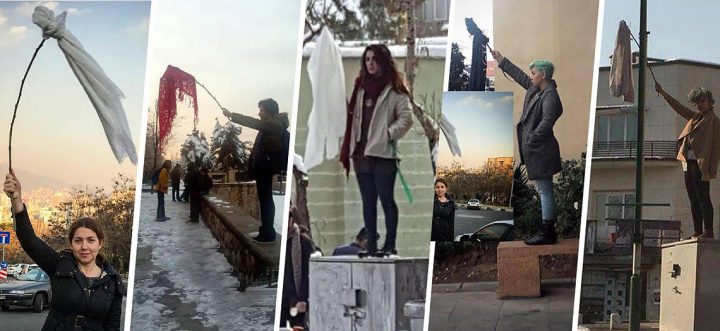
Photo: My Stealthy Freedom, Facebook
Martyrdom in Post-Revolution Iran
In her sociological study „Warring Souls – Youth, Media and Martyrdom in Post-Revolution Iran“ the author, Roxane Varzi, describes in detail a scene during the 1990s at one of the crossroads of public transportation and the usual mega city traffic in the middle of Teheran: an elderly woman trying to hail a cab for herself defies the Iranian regime by taking her headscarf off.
Young Iranians stare at her in complete amazement, security officials are taken off guard and just stand there puzzled. They don’t know what to do next. Their ideology and security protocol told them to arrest this brave woman, but they hesitated because in following that order they‘d had to admit that a much older woman – possibly a grandmother – posed a threat to their survival. They declared her insane so that they wouldn’t have to deal with her.
Everyone went about their daily business: the older lady continued to show her hair in public, the younger Iranians girls continued to defy the regime in their own style through headscarves that revealed more than they hid, and the security guards continued to abuse human rights arbitrarily whenever they chose to.
It is through an anecdote like this one that readers can learn why the Iranian regime has failed and why it sadly is still around. The Islamic Republic has lost in a spectacular way because it interferes in the most personal and intimate matters of Iranian citizens through a totalitarian and dogmatic structure that regulates every tiny step of every moment in everyone’s daily lives while at the same never accomplishing economic progress they promised. Of course not, because the Iranian dictatorship regulates economic affairs just as much as personal ones.
The moral bankruptcy of this dictatorship began the moment Iranians interconnected with the outside world and learned they’re fed propaganda, lies and denial and that they deserve better than this backwardness.
Fast forward to the present where Iranian women show their hair every Wednesday on their way to work or school. Iran is witnessing steady protests since December 2018 – at the forefront are women defying a misogynistic regime and the forced headscarves, but it doesn’t stop there. Iranians from all walks of life are part of state-wide demonstrations and courageous acts of civil disobedience. Their slogans are a reckoning with every single pillar of the Islamic Republic as they’re distancing themselves unquestionably from the anti-Western, anti-Semitic and Islamic beliefs of this dictatorship.
So why isn’t this dictatorship history yet? Mainly two reasons: first and foremost, appeasement from the outside. And secondly repression from the inside. These factors are intertwined as the ruling system gets away with grave human rights abuses while it is being treated as a normal government by Europeans and other nations. Europe is scared beneath recognition about mass waves of refugees from the Middle East and too blind to see that sugar coating a vile dictatorship like the Teheran regime only feeds to this existing problem – especially since Iran has caused the refugee crisis of 2015 by its meddling into the Syrian conflict.
In a rare moment of moral clarity and strategic foresight several European governments have accepted the interim President of Venezuela Guaidó as a rightful negotiating partner in support democratic change. More than just a symbolic gesture that Iranian demonstrators putting their lives on the line are hoping for as well the day they pick an interim leader too. That time is up after four long decades of injustice in Iran is clear, but sadly not to everyone.
Do you like this article? Please support SCHLAGLICHTER!
